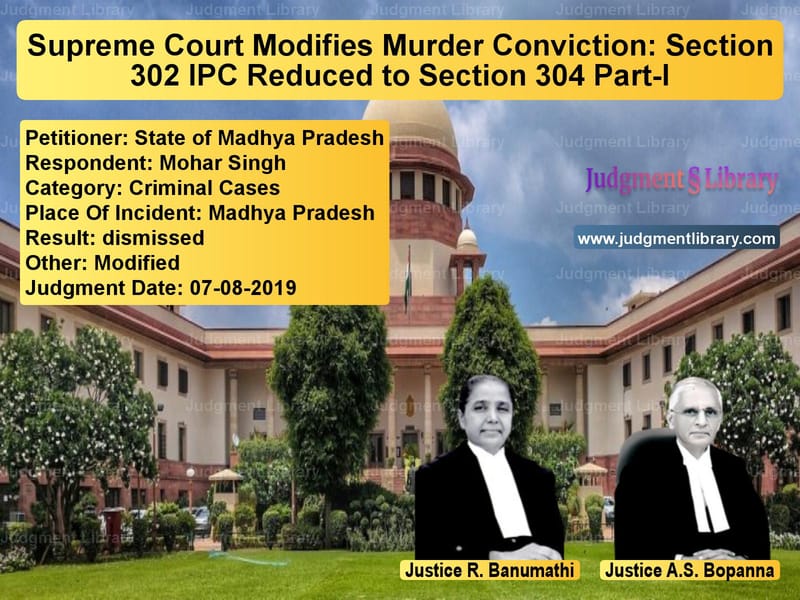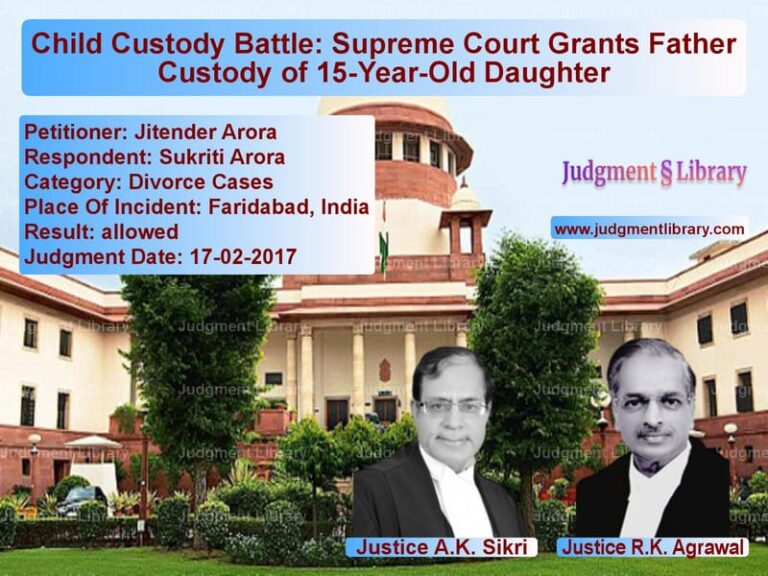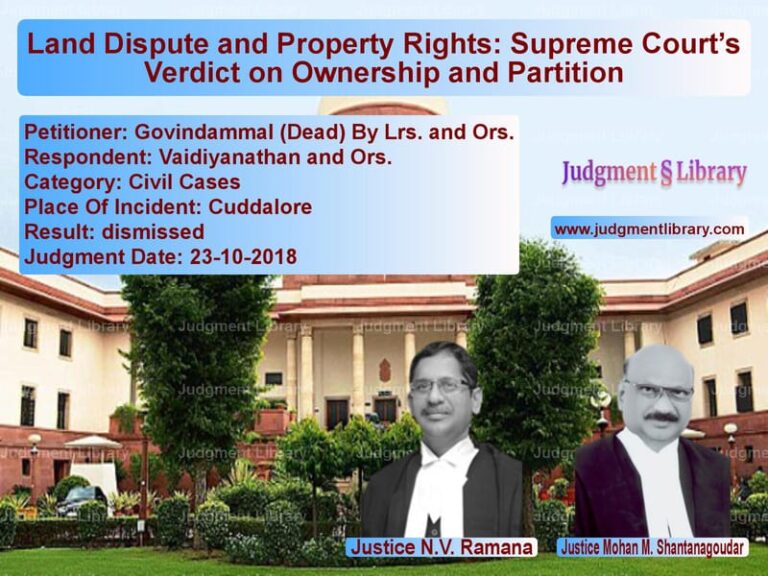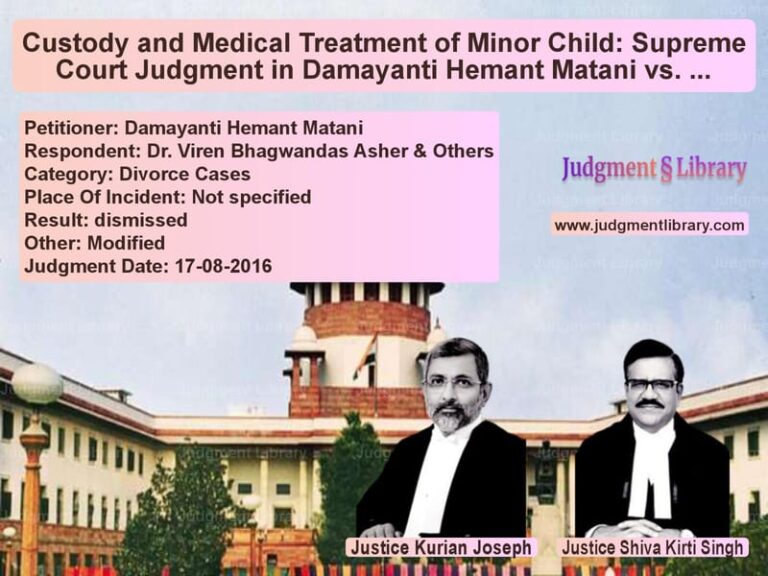Supreme Court Modifies Murder Conviction: Section 302 IPC Reduced to Section 304 Part-I
The Supreme Court of India, in the case of State of Madhya Pradesh vs. Mohar Singh, examined the circumstances under which a murder conviction under Section 302 of the Indian Penal Code (IPC) can be reduced to culpable homicide not amounting to murder under Section 304 Part-I IPC. The judgment highlights the role of sudden altercations, absence of premeditation, and the gravity of the injuries inflicted in determining criminal liability.
Background of the Case
The case arose from an incident that took place on March 9, 1993, in a village in Madhya Pradesh. The prosecution alleged that the accused, Mohar Singh, and his co-accused Ajab Singh, got into an argument with the deceased, Bhagwan Singh. During the altercation, Ajab Singh allegedly provoked Mohar Singh, who then went to his house, brought a gun, and fired at Bhagwan Singh, hitting him on the neck and causing his immediate death.
The case was based on an eyewitness account by the deceased’s brother, Harnam Singh (PW-4), who lodged the FIR. Based on the evidence, the Trial Court convicted Mohar Singh under Section 302 IPC and sentenced him to life imprisonment. However, the High Court of Madhya Pradesh modified the conviction to Section 304 Part-I IPC and sentenced the accused to the period already undergone, which was around seven years and six months, along with a fine of Rs. 15,000.
The State of Madhya Pradesh appealed against the High Court’s decision before the Supreme Court, seeking restoration of the original conviction under Section 302 IPC.
Key Legal Issues
- Whether the firing of a single gunshot by the accused amounts to murder (Section 302 IPC) or culpable homicide not amounting to murder (Section 304 Part-I IPC).
- Whether the High Court’s reasoning in reducing the sentence was legally justified.
- Whether the accused acted in a fit of rage due to provocation.
Arguments by the Appellant (State of Madhya Pradesh)
The State of Madhya Pradesh contended:
- The accused deliberately left the scene, brought a gun from his house, and fired at the deceased, proving premeditation.
- The gunshot injury was inflicted on a vital part of the body (the neck), indicating an intent to kill.
- The High Court erroneously considered the altercation as provocation and wrongly applied Section 304 Part-I IPC.
- The trial court’s conviction under Section 302 IPC should be restored as the accused had committed murder with full knowledge and intent.
Arguments by the Respondent (Mohar Singh)
The respondent countered:
- The altercation was sudden, and the accused fired the gunshot in the heat of the moment, without premeditation.
- The deceased had provoked the accused by using abusive language, leading to the shooting.
- The accused had already served over seven years in jail and had paid the fine of Rs. 15,000 as ordered by the High Court.
- The High Court’s decision to modify the conviction was legally sound and needed no interference.
Supreme Court’s Observations
1. Applicability of Section 302 IPC vs. Section 304 Part-I IPC
The Court analyzed whether the act was premeditated or a result of sudden provocation. It ruled:
“The evidence on record shows that the incident occurred during a heated exchange, and the accused acted on sudden provocation. While the act was intentional, it lacked the element of pre-planned murder necessary to sustain a conviction under Section 302 IPC.”
2. Injury Location and Gravity
The Court took into account that the gunshot was fired at the neck, which is a vital part of the body. However, it also observed:
“The presence of a single gunshot wound, coupled with the absence of a second or repeated attack, indicates that the accused did not act with the intention to inflict multiple fatal injuries.”
3. Impact of Provocation and Heat of the Moment
The Court found merit in the argument that the accused fired in a fit of rage after an argument. It stated:
“The presence of sudden provocation plays a significant role in reducing the offense from murder to culpable homicide. The High Court correctly considered this aspect.”
4. Role of the High Court in Modifying the Conviction
The Supreme Court emphasized that appellate courts have the authority to modify convictions based on the facts of the case. It upheld the High Court’s decision, stating:
“The High Court rightly concluded that the accused acted under sudden provocation and modified the conviction accordingly. There is no reason to interfere with this finding.”
Final Verdict
The Supreme Court ruled:
- The appeal by the State of Madhya Pradesh was dismissed.
- The conviction of the accused under Section 304 Part-I IPC was upheld.
- The sentence of the period already undergone (seven years and six months) was confirmed.
- The fine of Rs. 15,000 imposed by the High Court was deemed sufficient punishment.
Conclusion
This judgment clarifies the distinction between murder and culpable homicide not amounting to murder. It establishes that courts must carefully examine the circumstances surrounding the crime, particularly whether the act was premeditated or committed in a sudden rage. The ruling reinforces the principle that every case must be analyzed on its specific facts to determine the appropriate section under IPC.
Petitioner Name: State of Madhya Pradesh.Respondent Name: Mohar Singh.Judgment By: Justice R. Banumathi, Justice A.S. Bopanna.Place Of Incident: Madhya Pradesh.Judgment Date: 07-08-2019.
Don’t miss out on the full details! Download the complete judgment in PDF format below and gain valuable insights instantly!
Download Judgment: State of Madhya Prad vs Mohar Singh Supreme Court of India Judgment Dated 07-08-2019.pdf
Direct Downlaod Judgment: Direct downlaod this Judgment
See all petitions in Murder Cases
See all petitions in Bail and Anticipatory Bail
See all petitions in Judgment by R. Banumathi
See all petitions in Judgment by A. S. Bopanna
See all petitions in dismissed
See all petitions in Modified
See all petitions in supreme court of India judgments August 2019
See all petitions in 2019 judgments
See all posts in Criminal Cases Category
See all allowed petitions in Criminal Cases Category
See all Dismissed petitions in Criminal Cases Category
See all partially allowed petitions in Criminal Cases Category







